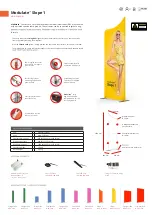
Horizontal Controls
2
Keysight InfiniiVision 3000 X-Series Oscilloscopes User's Guide
53
•
Normal
— the normal viewing mode for the oscilloscope.
In the Normal time mode, signal events occurring before the trigger are
plotted to the left of the trigger point (
▼
) and signal events after the trigger
plotted to the right of the trigger point.
•
XY
— XY mode changes the display from a volts-versus-time display to a
volts-versus-volts display. The time base is turned off. Channel 1 amplitude
is plotted on the X-axis and Channel 2 amplitude is plotted on the Y-axis.
You can use XY mode to compare frequency and phase relationships
between two signals. XY mode can also be used with transducers to display
strain versus displacement, flow versus pressure, volts versus current, or
voltage versus frequency.
Use the cursors to make measurements on XY mode waveforms.
For more information about using XY mode for measurements, refer to
•
Roll
— causes the waveform to move slowly across the screen from right to
left. It only operates on time base settings of 50 ms/div and slower. If the
current time base setting is faster than the 50 ms/div limit, it will be set to
50 ms/div when Roll mode is entered.
In Roll mode there is no trigger. The fixed reference point on the screen is the
right edge of the screen and refers to the current moment in time. Events
that have occurred are scrolled to the left of the reference point. Since there
is no trigger, no pre-trigger information is available.
If you would like to pause the display in Roll mode press the
[Single]
key. To
clear the display and restart an acquisition in Roll mode, press the
[Single]
key again.
Use Roll mode on low-frequency waveforms to yield a display much like a
strip chart recorder. It allows the waveform to roll across the display.
XY Time Mode
The XY time mode converts the oscilloscope from a volts-versus-time display to a
volts-versus-volts display using two input channels. Channel 1 is the X-axis input,
channel 2 is the Y-axis input. You can use various transducers so the display could
show strain versus displacement, flow versus pressure, volts versus current, or
voltage versus frequency.
Summary of Contents for InfiniiVision 3000 X Series
Page 1: ...Keysight InfiniiVision 3000 X Series Oscilloscopes User s Guide...
Page 8: ...8 Keysight InfiniiVision 3000 X Series Oscilloscopes User s Guide...
Page 24: ...24 Keysight InfiniiVision 3000 X Series Oscilloscopes User s Guide...
Page 48: ...48 Keysight InfiniiVision 3000 X Series Oscilloscopes User s Guide 1 Getting Started...
Page 62: ...62 Keysight InfiniiVision 3000 X Series Oscilloscopes User s Guide 2 Horizontal Controls...
Page 72: ...72 Keysight InfiniiVision 3000 X Series Oscilloscopes User s Guide 3 Vertical Controls...
Page 122: ...122 Keysight InfiniiVision 3000 X Series Oscilloscopes User s Guide 6 Digital Channels...
Page 128: ...128 Keysight InfiniiVision 3000 X Series Oscilloscopes User s Guide 7 Serial Decode...
Page 134: ...134 Keysight InfiniiVision 3000 X Series Oscilloscopes User s Guide 8 Display Settings...
Page 182: ...182 Keysight InfiniiVision 3000 X Series Oscilloscopes User s Guide 11 Trigger Mode Coupling...
Page 200: ...200 Keysight InfiniiVision 3000 X Series Oscilloscopes User s Guide 12 Acquisition Control...
Page 210: ...210 Keysight InfiniiVision 3000 X Series Oscilloscopes User s Guide 13 Cursors...
Page 252: ...252 Keysight InfiniiVision 3000 X Series Oscilloscopes User s Guide 15 Mask Testing...
Page 256: ...256 Keysight InfiniiVision 3000 X Series Oscilloscopes User s Guide 16 Digital Voltmeter...
Page 290: ...290 Keysight InfiniiVision 3000 X Series Oscilloscopes User s Guide 19 Print Screens...
Page 324: ...324 Keysight InfiniiVision 3000 X Series Oscilloscopes User s Guide 21 Web Interface...
Page 344: ...344 Keysight InfiniiVision 3000 X Series Oscilloscopes User s Guide 22 Reference...
















































